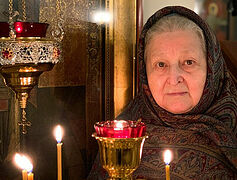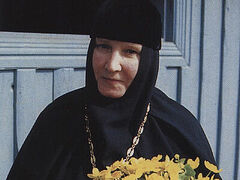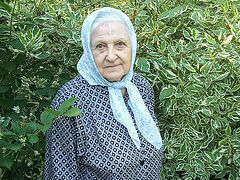 Schemanun Xenia (Kalinina) To strengthen our faith, the Lord sends us meetings with His saints. They are living examples and the embodiment of humility, patience, selflessness, and love for God and neighbor. I was vouchsafed to meet such people in the Church of St. Alexander Nevsky in Tbilisi.
Schemanun Xenia (Kalinina) To strengthen our faith, the Lord sends us meetings with His saints. They are living examples and the embodiment of humility, patience, selflessness, and love for God and neighbor. I was vouchsafed to meet such people in the Church of St. Alexander Nevsky in Tbilisi.
According to local old-timers, in the Soviet era there was a kind of a secret monastery at St. Alexander Nevsky’s Church, where the following Glinsk elders struggled: Metropolitan Zinovy (Mazhuga), Schema-Archimandrite Andronik (Lukash), and Schema-Archimandrite Vitaly (Sidorenko; 1928-1992), along with many secret monks and nuns. Their spiritual children would often travel from Russia to Vladyka and the Elders for advice. Sometimes only monks would sing in the choir, and such services were unforgettable.
I didn’t see the Elders, but the Lord vouchsafed me to meet their followers—their spiritual children. And there was a lot to learn from them. One of them was Mother Maria (Kalinina), later Schemanun Xenia.
She was a true disciple of Fr. Vitaly. She spoke a lot about him and other marvelous elders whom she had had the privilege of communicating with. Unfortunately, at that time it didn’t occur to me to write down her stories, and now that twenty years have passed, there’s little left in my memory.
Mother’s early years
Mother Maria was born in Russia to a simple peasant family. Her parents were very religious people who went through the difficult years of trials for Russia and the Orthodox Church. It was a time of dispossession, expropriation, and collectivization, when “surpluses” were taken away from the peasantry. All the cattle were taken away from the Kalinins. The father of the family was against collectivization, but nevertheless joined a collective farm and worked there solely out of pity for the animals. The family lived half-starved. Sometimes they ate only bread and water. Mother Maria’s father was entitled to a ration of some milk and sour cream, but he didn’t often bring it home—out of the kindness of his heart, he couldn’t refuse sharing it with destitute peasants with starving children. His wife sometimes scolded him: “Your own children have nothing to eat except bread,” and he would explain that those children didn’t even have bread and could die of hunger. “Never mind! We’ll endure, and God won’t abandon us.” When he died, the whole of the village gathered for his funeral, sobbing and lamenting: “What a benefactor we’ve lost!”
The children inherited strong faith and the spirit of non-acquisition from their parents, and Mother was an unmercenary and ascetic all her life.
I don't remember if their family was large, but I know for sure that she had a brother and a sister. In the 1990s, when I first met Mother Maria, her sister, an elderly schemanun, lived in Moscow with a cell-attendant, and was a spiritual daughter of Archimandrite Kirill (Pavlov).
At a convent
In her youth, Mother Maria used to make pilgrimages to holy sites. She liked life in convents very much, so she entered one and took monastic vows.
One day the abbess of the convent left on business, leaving Mother Maria in her place. The leadership position didn’t change Mother Maria’s simple way of life. A pilgrim—a sick man—arrived at the convent. He was given shelter, and Mother Maria would bring him food and speak to him. At the enemy’s instigation, the sisters of the convent were tempted and became suspicious of her behavior.
Upon the abbess’ return, the sisters slandered Mother Maria and accused her of committing a sin of the flesh, and she was expelled from the convent. It was winter and cold. Mother Maria walked from house to house, knocking on their doors and asking for a place to stay overnight, but all in vain since people were afraid of the authorities: To shelter a nun was dangerous in those days. She had to hide for some three days, spending her nights under a large pine tree. Her legs were swollen from the bitter cold, and she had difficulty walking. In such a deplorable state, she was picked up by one compassionate woman who sheltered her and nursed her back to health. Then Mother Maria had to leave the woman's house. She wandered, spending her nights at a train station, where Elder Vitaly found her and took her with him.
Arrival in Georgia
With the blessing of the Glinsk Elders, Mother Maria moved to Tbilisi and began to carry out her obedience in the choir at St. Alexander Nevsky’s Church.
At first Mother Maria missed Russia very much and was eager to return. She asked for Fr. Vitaly’s blessing, but he answered her with a joke: “Maria, whoever drinks water from the Kura River will not leave this place.” Thus, he didn’t bless her to return to Russia.
A clairvoyant nun and comforter
When I first started singing in the choir, it was hard for me to understand the order of the service and memorize the hymns, and I got upset. Mother Maria consoled me sympathetically: “Cheer up, Nika. Everything will be fine. You’ll even be a cantor and a choir director here.” I thought to myself: “The good Mother simply wants to comfort me.” I was sure that I would never understand and remember all of it. But with the help of God and through the prayers of my spiritual father, Fr. Vyacheslav Velichko, I slowly began to make progress, and a year and a half later Mother Maria’s words came true—I was appointed as cantor and choir director.
Mother Maria’s ministry in the Church
Sometimes it happens that at first a person enters the Church with the fear of God and treats everything there with reverence. But gradually he gets used to it, everything becomes ordinary, the soul loses its state of reverence, and idle talking, laughter, and joking during services begin. Over the many years of her life in the Church, Mother Maria didn’t lose the fear of God and was for us a living example of reverent behavior.
Mother Maria shared the following story. Once in a dream she was in the middle of the church. The royal doors leading to the altar opened, and she saw the Savior crucified on the Cross. Suddenly the wounds on His hands and feet started bleeding. The Lord came to life and turned to Mother Maria with the following words: “You see how people are crucifying Me again. By talking in church, they hammer in a nail; by laughing and joking they hammer in another nail; and by quarrelling they hammer in another one...” (And He continued to list the sins committed in church). Mother Maria woke up in horror—the feeling was so real! She possessed spiritual wisdom and was wary of visions. She approached Archimandrite Raphael (Karelin) for advice, and he confirmed that it had been a sign from God.
Her story made a strong impression on us. Later we hung a sign in the choir (as a reminder) with the saying of St. Ambrose of Optina: “For talking in church, the Lord allows you to fall into grave temptations” (meaning talking during services).
Mother Maria related: “Whenever the Glinsk Monastery Elders celebrated the Liturgy, we forgot about the time and didn’t feel any fatigue, as though we were in Heaven.”
Mother Maria carried out her obedience in the choir for many years. She was said to have had a beautiful voice in her youth. But I met her when she was elderly and her voice had begun to crack. She attended church services every day, was always punctual and reliable—she would never let you down and was the first to rush to help you.
She spent most of her time in silence. But her silence wasn’t because she was sullen. She was always welcoming and kind. If she entered into a conversation, it wasn’t for idle talk, but to say something useful for the soul. However, the tone of her voice was never didactic or moralizing. It was always a friendly conversation based on mutual trust.
In her spare time, Mother would sit in her corner of the kliros, pulling on the knots of a prayer rope or reading the Psalter. She spent most of her time in prayer. She was quiet and inconspicuous.
“The whole world has gone mad”
On Wednesday evenings, a moleben with the akathist to St. Nicholas the Wonderworker was always served at St. Alexander Nevsky’s Church. One day Mother Maria decided not to stay for the moleben, but went about her business. On the way she began to read the akathist on her prayer rope. Stopping at a shop window, she started scrutinizing the goods and prices. Then a strange-looking man running past barked right into her ear: “The whole world has gone mad!” At that moment she suddenly realized that she had been distracted from prayer. She took her prayer rope and continued on her way praying.
It’s more blessed to give than to receive
As already noted, Mother Maria was non-acquisitive and led an ascetic life. Whatever came her way, she distributed to the needy. I don’t remember her ever treating herself—she was a strict faster. She would drink only hot boiled water and say: “Don’t pour me a dirty one,” (that’s what she called tea leaves). “I’ve been used to it since childhood.” Whenever someone treated her to cake or candy, she didn’t refuse. She would take it, wrap it up and, as it turned out, give it to the old infirm nuns who lived in a small community not far from the church.
I heard from Mother Maria that the Elders had blessed her to live in seclusion, and only if necessary she could shelter someone for a period of no more than three days. She fulfilled this blessing without fail.
She lived on the outskirts of the city. I visited her when she was ill and I was struck by the austerity of her life. She had only an iron bed, a bedside table, a small table, a stool, and a kerosene stove in her tiny, semi-dark hut. The only coat hung on a nail. Her ascetic life wasn’t ostentatious and not an end in itself. She concealed her asceticism as best she could.
For all her poverty, Mother Maria’s neighbors repeatedly robbed her. Climbing over the fence when she was away, they would steal whatever they could: the one valuable icon, a canister of kerosene (her reserve for the winter), and even half-eaten khachapuri.1 In the end, they cut her electrical wires, and Mother Maria was left without electricity, and had to kept by with a rushlight. We found all this out by chance—she endured trials patiently and never complained.
And though I bestow all my goods to feed the poor, and though I give my body to be burned, and have not charity, it profiteth me nothing. Charity suffereth long, and is kind; charity envieth not; charity vaunteth not itself, is not puffed up, Doth not behave itself unseemly, seeketh not her own, is not easily provoked, thinketh no evil; Rejoiceth not in iniquity, but rejoiceth in the truth; Beareth all things, believeth all things, hopeth all things, endureth all things (1 Cor. 13:3-7).
Mother Maria possessed all of these qualities of love.
To be continued…



